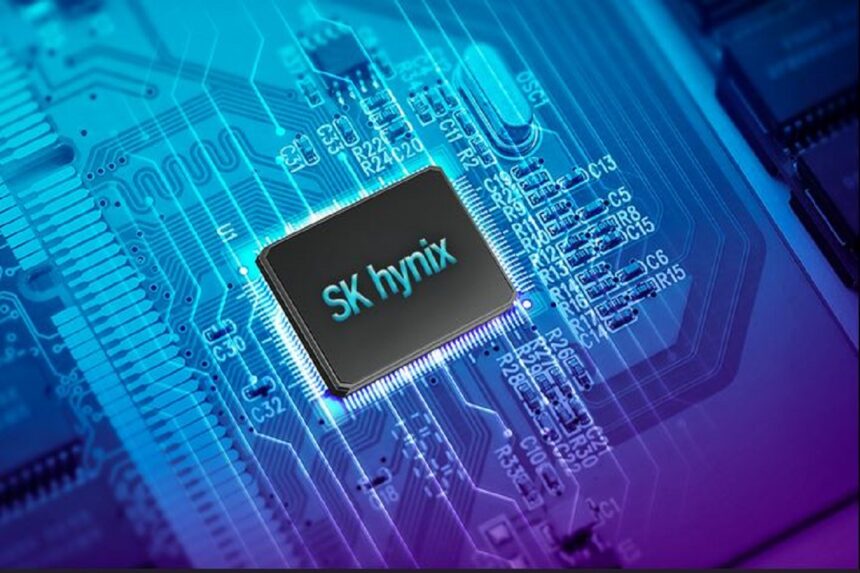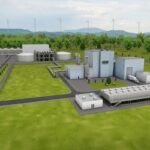SK Hynix, one of the world’s largest producers of memory chips, has been awarded $458 million in funding under the U.S. CHIPS and Science Act. This amount exceeds the $450 million initially proposed earlier in 2024, marking a significant step forward in the company’s plans to expand its operations in the United States. The funding aims to support the establishment of a state-of-the-art high-bandwidth memory (HBM) production facility in West Lafayette, Indiana, as part of a broader $3.87 billion investment.
SK Hynix’s New HBM Facility: Key Details
The $458 million grant will be used to help SK Hynix develop a new advanced packaging fabrication and research and development (R&D) facility in Indiana. The project, which is set to begin mass production in the second half of 2028, will focus on producing next-generation HBM. In addition to manufacturing, the facility will serve as a hub for research into artificial intelligence (AI) products.
This strategic expansion is expected to strengthen the U.S. semiconductor supply chain, particularly for AI hardware, which is essential for emerging technologies like machine learning and advanced computing. The partnership between SK Hynix and U.S. educational institutions, including Purdue University and Ivy Tech Community College, will also play a critical role in workforce development. These collaborations aim to cultivate a skilled talent pool in Indiana, which is expected to boost both local job creation and national security by reinforcing the U.S. position in global semiconductor production.
SK Hynix’s Role in the Global Semiconductor Industry
SK Hynix is a leader in the semiconductor industry, particularly known for its high-bandwidth memory chips, which are integral to AI, data centers, and other advanced computing applications. With the increasing demand for AI-driven technologies, the establishment of this new facility in Indiana positions the company to meet the growing market needs. Additionally, it highlights the United States’ efforts to reduce its reliance on foreign semiconductor production and bolster its domestic manufacturing capabilities.
Secretary of Commerce Gina Raimondo emphasized the importance of the partnership, stating, “With this investment in SK Hynix and their collaboration with Purdue University, we are solidifying America’s AI hardware supply chain in a way no other country on Earth can match.” This sentiment underscores the strategic importance of such investments in ensuring U.S. leadership in AI and high-performance computing.
The CHIPS Act and Its Impact on the U.S. Semiconductor Industry
The CHIPS and Science Act, which was passed in 2022, represents a significant investment by the U.S. government to strengthen domestic semiconductor production. The act provides funding and incentives for companies to build semiconductor manufacturing plants and R&D centers in the U.S. This is part of a broader strategy to ensure the nation’s technological and economic security in the face of increasing global competition.
SK Hynix joins several other companies in finalizing their CHIPS Act funding agreements, including industry giants such as TSMC, Intel, and Micron. The funding will help these companies scale up production and enhance their research efforts, ensuring that the U.S. remains at the forefront of semiconductor innovation.
SK Hynix’s Commitment to AI and Workforce Development
In addition to its manufacturing efforts, SK Hynix is also committed to fostering innovation in artificial intelligence. The new Indiana facility will not only produce cutting-edge memory chips but will also serve as an R&D hub dedicated to AI applications. This move aligns with the growing demand for advanced computing power to support AI models, machine learning, and other next-generation technologies.
The collaboration with Purdue University and Ivy Tech Community College will also contribute to the creation of a skilled workforce, addressing the growing need for professionals in semiconductor manufacturing and AI development. This partnership is a clear example of how private companies and educational institutions can work together to build a pipeline of talent that will drive innovation for years to come.
The Potential Impact on Indiana’s Economy
The new facility in West Lafayette is expected to create hundreds of jobs in the state, further bolstering Indiana’s position as a hub for technological development. The CHIPS Act funding is likely to have a ripple effect on the local economy, attracting other technology companies and fostering a vibrant ecosystem of innovation and talent.
Indiana has been positioning itself as a key player in the U.S. tech landscape, with investments in semiconductor manufacturing, AI, and other emerging technologies. SK Hynix’s decision to establish a major R&D and manufacturing facility in the state is expected to accelerate this trend, with long-term benefits for both the local community and the broader U.S. economy.
The Future of the CHIPS Act Amid Political Uncertainty
While the CHIPS Act has received strong support under the current administration, its future remains uncertain as the U.S. heads into the 2024 presidential election. President-elect Donald Trump has expressed opposition to the CHIPS Act, arguing that the government should have imposed tariffs on the semiconductor industry rather than providing direct funding.
Despite this potential shift in policy, the current momentum in the semiconductor sector, driven by both public and private investment, suggests that the U.S. will continue to play a significant role in the global tech ecosystem. SK Hynix’s continued investment in the U.S. is a testament to the potential long-term benefits of the CHIPS Act, regardless of future political changes.
Additional Chip Funding News: Key Developments
While SK Hynix’s CHIPS Act funding is one of the most notable recent developments, other companies in the semiconductor and AI space have also secured significant investments.
Enfabrica Raises $115 Million for Next-Generation Networking Chips
Enfabrica, a startup specializing in networking chips, has raised $115 million in a Series B funding round. The company plans to use the funds to develop its ACF SuperNIC chip, which promises to deliver four times the bandwidth and enhanced multipath resiliency compared to current network interface controllers. This innovation is expected to play a crucial role in next-generation data center and cloud infrastructure.
Aviz Networks Secures $17 Million for AI-Driven Networking Solutions
Aviz Networks, a company focused on AI-driven networking solutions for data centers and edge networks, has raised $17 million in a Series A funding round. The company’s solutions are designed to optimize network performance and reliability in the age of AI and advanced computing, making them a valuable addition to the growing ecosystem of AI infrastructure.
MatX Develops AI Chips and Raises $80 Million
MatX, a startup founded by former Google engineers, has raised $80 million in a Series B funding round. The company is developing specialized chips designed to accelerate AI model training and inference, a critical component in the rapid advancement of AI technologies.
D-Matrix Launches Accelerator Card for AI Inference Workloads
D-Matrix, a company focused on AI hardware, has introduced an accelerator card designed to enhance AI inference performance. This new card is capable of managing low-latency data batches, making it an essential tool for applications like generative AI video creation.
Infleqtion Receives $11 Million for Quantum Technology
Infleqtion, a company specializing in quantum components, has secured $11 million in funding from the U.S. Department of Defense. The funding will support the development of its Rack Mounted Optical Clocks project, which aims to advance precision timing solutions and enhance military communications.
Akash Systems Wins $27 Million Contract for Cooling Servers
Akash Systems has been awarded a $27 million contract from NxtGen Datacenter and Cloud Technologies to supply its Diamond cooling servers. These servers will be deployed in NxtGen’s data centers across India, underscoring the growing demand for energy-efficient cooling solutions in the data center industry.
Biomemory Raises $18 Million for DNA Data Storage
Biomemory, a French startup developing DNA-based data storage technology, has raised $18 million in a Series A funding round. The company plans to use the funds to complete its first-generation data storage appliance and accelerate the commercialization of its offering.
FAQs
What is the CHIPS and Science Act?
The CHIPS and Science Act is a U.S. government initiative aimed at boosting domestic semiconductor manufacturing and research. It provides funding and incentives for companies to build and expand semiconductor production facilities in the U.S., ensuring national security and economic competitiveness.
What will SK Hynix produce in its new Indiana facility?
SK Hynix will focus on manufacturing next-generation high-bandwidth memory (HBM) chips at its new facility in Indiana. The site will also serve as a research and development center for AI products.
How will the CHIPS Act impact the U.S. economy?
The CHIPS Act is expected to create thousands of jobs, boost innovation, and strengthen the U.S. semiconductor industry. By investing in domestic manufacturing, the act aims to reduce reliance on foreign suppliers and enhance national security.
Why is SK Hynix’s investment in Indiana important?
SK Hynix’s investment in Indiana is important because it supports the growth of the U.S. semiconductor supply chain, particularly for AI hardware. The facility will create jobs, foster innovation, and contribute to the U.S.’s technological leadership in global markets.
How does the CHIPS Act support workforce development?
The CHIPS Act encourages partnerships between semiconductor companies and educational institutions, providing training programs and developing curricula to build a skilled workforce in the semiconductor and AI sectors.


















